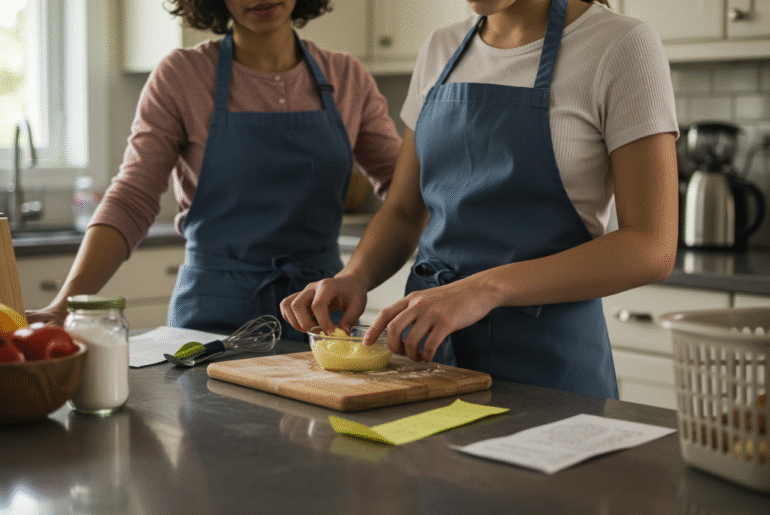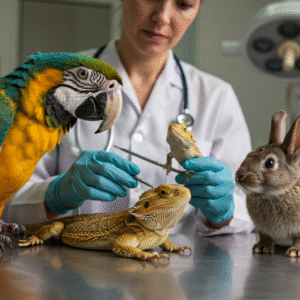This article may contain references to products or services from one or more of our advertisers or partners. We may receive compensation when you click on links to those products or services. Nonetheless, our opinions are our own.
The information presented in this article is accurate to the best of our knowledge at the time of publication. However, information is subject to change, and no guarantees are made about the continued accuracy or completeness of this content after its publication date.
- Main Points to Remember
- Introduction
- Using Your Kitchen to Build Life Skills
- Why the Kitchen Works for Learning Daily Skills
- Important Life Skills Learned Through Cooking
- How to Begin Building a Kitchen Learning Space
- Basic Equipment and Tools Checklist
- Stocking Up on Learning-Friendly Pantry Items
- How to Turn Cooking Into a Life Skill Lab
- Practical Steps to Build Life Skills in the Kitchen
- Final Thoughts
- Frequently Asked Questions
- Recommended Reads
Main Points to Remember
- Your kitchen can be a place where high school students learn important skills they need for daily life.
- This space helps them grow and lets them practice useful things like cooking, getting things in order, and working with others.
- Caregivers can help with IEP goals by using cooking as a way to do real, hands-on learning.
- Simple jobs, such as sorting groceries or doing the laundry, help build up their independence and daily sense of duty.
- A planned way of learning in the kitchen helps students reach goals, feel ready to do things on their own, and get set for growing up.
Introduction
Have you ever wondered if your kitchen can help you get some important life skills? For high school students, doing things in the kitchen each day is a good and hands-on way to get ready for adult life. Cooking is just one part of it. A kitchen can be a place where students learn how to be independent. It can help them practice solving problems and learn to work with others. When you make your home feel like a life skill lab, normal kitchen work turns into a way to grow and learn. The lessons you get in the kitchen go far beyond just making food.
Using Your Kitchen to Build Life Skills
A life skill lab in your kitchen is not just a space to cook. It is a place where students can try out real things that match with their Individualized Education Program (IEP) goals. This area lets them work on what they learn every day. It helps grow their skills and makes them feel sure of what they can do.
Caregivers help a lot by bringing in activities that are right for the child’s age and needs. With the right setup, the kitchen can be a safe and helpful place for learning. People can work on skills like organization, making choices, and thinking well, all while doing real things in the kitchen.
Why the Kitchen Works for Learning Daily Skills
Your kitchen is not just a place where you make food. It is where you can practice important habits and learn to be responsible. When you chop vegetables, put away groceries, or clean up, you get real practice. These simple tasks help you learn to do things on your own and use your time well.
Doing set kitchen tasks helps people feel sure of themselves and get better at solving problems. When you measure out things, you practice math. If you read and follow recipes, you learn to do things in order and pay close attention. These hands-on things help us learn in ways we use in real life.
The kitchen works well for people of all ages. You can use it to show kids simple daily habits. This space can also help teens get better at planning and leading. The kitchen helps everyone keep learning and getting better over time.
Important Life Skills Learned Through Cooking
Cooking helps you build basic skills that you need in life. These skills help you be more on your own and do well. What you learn in the kitchen matches with educational goals and goals you set for yourself. Doing tasks in the kitchen is a good way to practice building useful skills.
- Time management: Planning and making meals on a set schedule helps you get better at being ready on time and getting things done in order.
- Organization: Putting together ingredients and using kitchen tools shows you how to be neat and take care of your things.
- Problem-solving: Dealing with things you did not see coming in the kitchen helps you become someone who does not give up easily.
- Laundry readiness: Washing aprons and kitchen cloths helps you learn to take care of things that belong to you.
With help from caregivers, cooking can be a great way to learn how to work as a team. Kids also learn how to adjust to new things and feel proud when they finish a job. These real-life lessons make kids want to do more, like make meals for their family or maybe look at other job choices for the future.
Voted "Best Overall Budgeting App" by Forbes and WSJ
Monarch Money helps you budget, track spending, set goals, and plan your financial future—all in one app.
Get 50% OFF your first year with code MONARCHVIP
How to Begin Building a Kitchen Learning Space
Making a kitchen-based life skill lab needs good planning. Set up the area with tools and things that fit each person’s growth and what they need every day. This helps to make a safe and set place where people can learn. Here, the things you do each day can help you learn to be independent.
Pick tasks for them that they can do but that still push them a bit, so they feel sure about what they can do. Begin with easy things, then let them try harder ones as they get better. If you stick to it and cheer them on, your kitchen will turn into a busy and fun place where they learn real-life skills.
Basic Equipment and Tools Checklist
| Item | Purpose |
|---|---|
| Measuring cups | Teaches precision in recipes and supports math skills |
| Mixing bowls | Reinforces cleanliness, multitasking, and preparation habits |
| Aprons | Promotes hygiene, laundry skills, and self-care responsibility |
| Cutting boards | Builds safe food handling and prep techniques |
| Grocery labels | Encourages sorting, organization, and critical thinking |
As students feel more sure of themselves, you can give them tools that help them build better skills and learn more.
Stocking Up on Learning-Friendly Pantry Items
Having a range of useful ingredients in the kitchen helps you try new things and be flexible. The right things in your kitchen also help you learn more about making meals, eating healthy, and growing as a person.
- Rice and pasta: These are good for showing the many ways of cooking. They help with learning simple meal steps.
- Canned goods: You can keep these for a long time. They help you plan and stay organized in the kitchen.
- Seasonings and spices: These help people notice different flavors. They also encourage you to try new things when cooking.
- Fresh vegetables: These are good for building healthy habits. They also help people learn what goes into a meal.
These items can help with many things. They help people get better at knowing about food and practice sorting groceries. A caregiver can use these with IEP goals, so they make a learning plan that fits the person. This helps build skills that are important.
How to Turn Cooking Into a Life Skill Lab
Turning everyday jobs in the kitchen into a time to learn gives people skills they will use all their lives and helps them feel sure about what they do. With some planning and help, caregivers can get learners to do things by themselves and reach simple, useful goals.
Each time you cook, you have a chance to practice making choices, planning, and keeping things in order. These skills help you do well in school and in your daily life.
Step 1: Creating a Safe, Organized Workspace
A clean and safe space helps people learn better. It lets them pay attention and feel confident doing things on their own. When you set up the area, think about safety and how it will be used.
- Clear countertops to cut down on distractions and help you stay focused
- Keep sharp tools out of reach for young or beginner learners
- Label ingredients and supplies to help people do things on their own
- Create safety checklists with visuals to help everyone build good habits
An organized setup helps to build trust in yourself. It also helps you feel ready to do things on your own.
Step 2: Assigning Tasks Based on Age and Ability
Giving out tasks by looking at age and skill level helps people feel involved and grow. Start with easy jobs first. As they learn, give them more to do step by step.
- Young children: Kids at this age can sort the utensils, help wipe down surfaces, or do some simple mixing.
- High school students: Students in high school can handle the shopping list, plan meals, or set up a budget.
- Teenagers: Teens can lead and make choices on tasks. For example, they can cook for the family.
Giving students a chance to lead helps them feel sure about themselves. It also teaches them to take charge of their actions.
Practical Steps to Build Life Skills in the Kitchen
Using a clear, step-by-step plan helps people build good habits in the kitchen. This also makes it easier for them to see how kitchen tasks match things that happen in real life.
When you connect everyday things like doing laundry, planning meals, or making a budget to bigger goals, you help students build both basic and advanced life skills.
Step 1: Simple Meal Plans and Grocery Lists
Start with easy meals to cook. Make short grocery lists. This will help you practice how to order, keep to your budget, and stay on time.
- Use 3-item recipes for easy meal planning
- Group grocery items to help practice sorting and keeping things organized
- Add coupons to help learn about budgets and money responsibility
- Follow a schedule to practice knowing about time and planning ahead
These real-life uses help people see how abstract lessons work. They also make it easier to understand and use what you learn.
Step 2: Practice Measuring, Timing, and Following Steps
Teach learners how to measure ingredients the right way. Show them how to follow each step in order. These things help build focus. They also help with math skills and learning to do things in the right order.
- Measure dry and liquid ingredients
- Use timers to help with each step of cooking
- Read and follow easy recipe instructions
Each time students finish a task well, they feel better about themselves. This also helps them get ready for real-life work.
Final Thoughts
Turning your kitchen into a place to learn life skills helps people build important skills. These skills are useful long after you leave the kitchen. In this space, you can work on being better at organizing and using your time well. You also practice working in teams and making choices. It’s a simple place, but it gives you many chances to get better at what you do every day.
Caregivers can help kids grow and learn by making a safe place with clear rules. When you pick tasks that fit the child’s age, you make it easier for them to try new things by themselves. The kitchen is a great place to pick up important skills or work on IEP goals. Start today. You can teach good habits, let kids feel sure about what they do, and help them get ready for adult life.
Frequently Asked Questions
How can I make kitchen activities safe for young children?
Use tools that are safe for kids and keep a close eye on them. You can start with some simple jobs like sorting foods, stirring, or picking out what you need from the pantry. Always make sure that safety comes first. At the same time, help them feel that they have some responsibility by giving them small and easy tasks.
What are some quick life skill lessons I can teach while cooking?
Teach how to measure ingredients, sort groceries, or clean up after cooking. These things help your child practice math, get better at being organized, and stay clean. You can also add laundry time. Have them wash aprons and kitchen towels.
How do I keep kids engaged in kitchen tasks?
Make tasks fun and let them use their hands to do things. Give them some colorful utensils to use. Let them help choose the meals, and say good things about what they do. Switch job roles often to keep things interesting for them. Show how these things can help them reach their own goals.
How often should we schedule kitchen life skill sessions?
Aim to practice at least one time each week. If you are a high school student, having one or two sessions each week gives you a regular chance to build steady, new skills. It helps you practice what you have learned and use those things outside of school.

Reviewed and edited by Albert Fang.
See a typo or want to suggest an edit/revision to the content? Use the contact us form to provide feedback.
At FangWallet, we value editorial integrity and open collaboration in curating quality content for readers to enjoy. Much appreciated for the assist.
Did you like our article and find it insightful? We encourage sharing the article link with family and friends to benefit as well - better yet, sharing on social media. Thank you for the support! 🍉
Article Title: Kitchen Life Skills for Teens: Build Independence Through Cooking
https://fangwallet.com/2025/07/18/kitchen-life-skills-for-teens-build-independence-through-cooking/The FangWallet Promise
FangWallet is an editorially independent resource - founded on breaking down challenging financial concepts for anyone to understand since 2014. While we adhere to editorial integrity, note that this post may contain references to products from our partners.
The FangWallet promise is always to have your best interest in mind and be transparent and honest about the financial picture.
Become an Insider

Subscribe to get a free daily budget planner printable to help get your money on track!
Make passive money the right way. No spam.
Editorial Disclaimer: The editorial content on this page is not provided by any of the companies mentioned. The opinions expressed here are the author's alone.
The content of this website is for informational purposes only and does not represent investment advice, or an offer or solicitation to buy or sell any security, investment, or product. Investors are encouraged to do their own due diligence, and, if necessary, consult professional advising before making any investment decisions. Investing involves a high degree of risk, and financial losses may occur including the potential loss of principal.
Source Citation References:
+ Inspo
There are no additional citations or references to note for this article at this time.












































